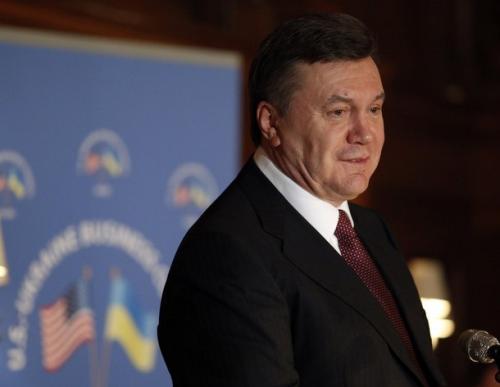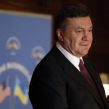
Yanukovych Explains Policy Priorities During US Visit
Publication: Eurasia Daily Monitor Volume: 7 Issue: 178
By:

Ukrainian President, Viktor Yanukovych, used his September 22-24 second visit to the US as president to clarify his views and intentions towards the West. Many in the US and Western Europe have been concerned by the nature of Kyiv’s relations with Moscow under Yanukovych, especially after the Ukrainian President dropped NATO membership from Ukraine’s agenda under Russian pressure. Furthermore, the April gas-for-navy treaty resulting in the allowance of the Russian Black Sea Fleet to stay in Sevastopol until at least 2042 in exchange for gas price discounts, has also furthered this unease. Issues relating to freedom of speech have also been raising concern. Yanukovych tried, but most likely failed to dispel those concerns in his interviews and during his meeting with the Atlantic Council, although affirmed that European integration remains his government’s top priority.
The European Union remains Ukraine’s strategic choice according to Yanukovych, who assured this to the Associated Press and the Wall Street Journal during an interview. At the same time, he stated that it was important to develop relations with Russia in order to guarantee the stability of Russian gas deliveries to Europe. He also confirmed that unlike his predecessor, Viktor Yushchenko, his government would not pursue the NATO membership agenda as this might “unbalance” the international order (www.president.gov.ua, September 22; www.korrespondent.net, September 23). For Yanukovych and the east-Ukrainian industrial elite, whose interests his government expresses, the EU is primarily a large market for raw materials from Ukraine and Russia whose main transit route is Ukraine. Russia remains a key supplier of gas upon which the east-Ukrainian heavy industry depends on. As Ukraine’s NATO aspirations were a serious concern for Moscow, it has been natural for the pragmatic Yanukovych to sacrifice this for the sake of gas.
In his address to the Atlantic Council, Yanukovych affirmed that the EU remains the main priority while Russia is “another important priority.” Yanukovych said that “unnecessary tension” has been removed from relations with Moscow, but admitted that problems remain. However, Yanukovych named only one problem, the construction of the South Stream pipeline which his team views as the most serious threat to Ukraine’s role as the main transit route for Russian gas. “The strategic goal is not just to maintain but also to strengthen Ukraine’s role as the main transit route for Russian gas bound for Europe,” Yanukovych explained.
Addressing Ukraine’s relations with the EU, Yanukovych said that Ukraine will soon complete talks on an association agreement which should secure access to the EU market, visa-free travel and “clear membership prospects” (www.president.gov.ua, September 23). In fact, talks with the EU have been difficult due to trade disputes, making the association agreement to remain unsigned this year, despite Yanukovych’s push. The Ukrainian President’s aide, Serhy Lyovochkin, predicted that the agreement would be signed at the Ukraine-EU summit scheduled for November 22, but the EU spokeswoman for enlargement, Angela Filote, said recently that it would not be signed in November. Filote suggested this may happen next year (Interfax, September 22). The EU’s most influential members such as Germany and France are very skeptical about Ukrainian membership aspirations, so Kyiv’s insistence on “the membership prospect” does not facilitate talks on the association agreement.
Yanukovych dismissed international concerns that freedom of speech may be in danger in Ukraine (EDM, September 27). Commenting during an interview on the recent disappearance of the journalist, Vasyl Klymentyev, in the eastern city of Kharkiv, he said it had nothing to do with his government’s policy, adding that such problems are not unique to Ukraine (www.korrespondent.net, September 23). He told the Atlantic Council that he “categorically disagreed” with those who claim that freedom of speech is on the verge of collapsing in Ukraine. Yanukovych said the government has had nothing to do with recent conflicts between media owners and editors or journalists (www.president.gov.ua, September 23). The Ukrainian Security Service (SBU) chaired by Yanukovych’s appointee, Valery Khoroshkovsky, has been involved in several recent conflicts with journalists, making Yanukovych’s arguments sound unconvincing.
Yanukovych paid much attention to relations with Washington. Despite the visits to Ukraine this year by the Secretary of State, Hillary Clinton, and the Under-Secretary of State for Political Affairs, William Burns, the dominant view in Kyiv, both among the ruling elite and the opposition, is that the Obama administration does not view relations with Ukraine as being important. Addressing the Atlantic Council, Yanukovych hinted that he was not satisfied with the low frequency of his meetings with Obama. Yanukovych stated that it was necessary to “maintain the balance in relations with Europe, the US and Russia.” Yanukovych invited the US to participate in a conference on Chernobyl scheduled for April 2011 (www.president.gov.ua, September 23). The Yanukovych administration expects that in return for Yanukovych’s promise to Obama to eliminate enriched uranium (EDM, April 21), the US will provide financial assistance for the project aimed at reinforcing the concrete shell that covers the reactor in Chernobyl which was damaged by the 1986 accident. Deputy Prime Minister, Andry Klyuyev, recently noted that the project is seriously short of funds and behind the schedule (Interfax-Ukraine, September 23).




